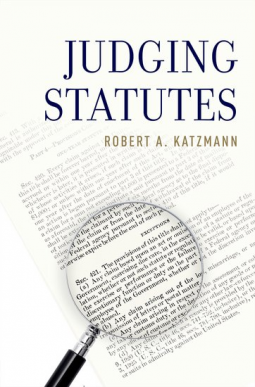
Judging Statutes
by Robert A. Katzmann
This title was previously available on NetGalley and is now archived.
Buy on Amazon
Buy on BN.com
Buy on Bookshop.org
*This page contains affiliate links, so we may earn a small commission when you make a purchase through links on our site at no additional cost to you.
Send NetGalley books directly to your Kindle or Kindle app
1
To read on a Kindle or Kindle app, please add kindle@netgalley.com as an approved email address to receive files in your Amazon account. Click here for step-by-step instructions.
2
Also find your Kindle email address within your Amazon account, and enter it here.
Pub Date Sep 11 2014 | Archive Date Aug 05 2014
Description
In an ideal world, the laws of Congress--known as federal statutes--would always be clearly worded and easily understood by the judges tasked with interpreting them. But many laws feature ambiguous or even contradictory wording. How, then, should judges divine their meaning? Should they stick only to the text? To what degree, if any, should they consult aids beyond the statutes themselves? Are the purposes of lawmakers in writing law relevant?
Some judges, such as Supreme Court Justice Antonin Scalia, believe courts should look to the language of the statute and virtually nothing else. Chief Judge Robert A. Katzmann of the U.S. Court of Appeals for the Second Circuit respectfully disagrees. In Judging Statutes, Katzmann, who is a trained political scientist as well as a judge, argues that our constitutional system charges Congress with enacting laws; therefore, how Congress makes its purposes known through both the laws themselves and reliable accompanying materials should be respected. He looks at how the American government works, including how laws come to be and how various agencies construe legislation. He then explains the judicial process of interpreting and applying these laws through the demonstration of two interpretative approaches, purposivism (focusing on the purpose of a law) and textualism (focusing solely on the text of the written law). Katzmann draws from his experience to show how this process plays out in the real world, and concludes with some suggestions to promote understanding between the courts and Congress.
When courts interpret the laws of Congress, they should be mindful of how Congress actually functions, how lawmakers signal the meaning of statutes, and what those legislators expect of courts construing their laws. The legislative record behind a law is in truth part of its foundation, and therefore merits consideration.
Some judges, such as Supreme Court Justice Antonin Scalia, believe courts should look to the language of the statute and virtually nothing else. Chief Judge Robert A. Katzmann of the U.S. Court of Appeals for the Second Circuit respectfully disagrees. In Judging Statutes, Katzmann, who is a trained political scientist as well as a judge, argues that our constitutional system charges Congress with enacting laws; therefore, how Congress makes its purposes known through both the laws themselves and reliable accompanying materials should be respected. He looks at how the American government works, including how laws come to be and how various agencies construe legislation. He then explains the judicial process of interpreting and applying these laws through the demonstration of two interpretative approaches, purposivism (focusing on the purpose of a law) and textualism (focusing solely on the text of the written law). Katzmann draws from his experience to show how this process plays out in the real world, and concludes with some suggestions to promote understanding between the courts and Congress.
When courts interpret the laws of Congress, they should be mindful of how Congress actually functions, how lawmakers signal the meaning of statutes, and what those legislators expect of courts construing their laws. The legislative record behind a law is in truth part of its foundation, and therefore merits consideration.
Available Editions
| EDITION | Other Format |
| ISBN | 9780199362134 |
| PRICE | $28.95 (USD) |



